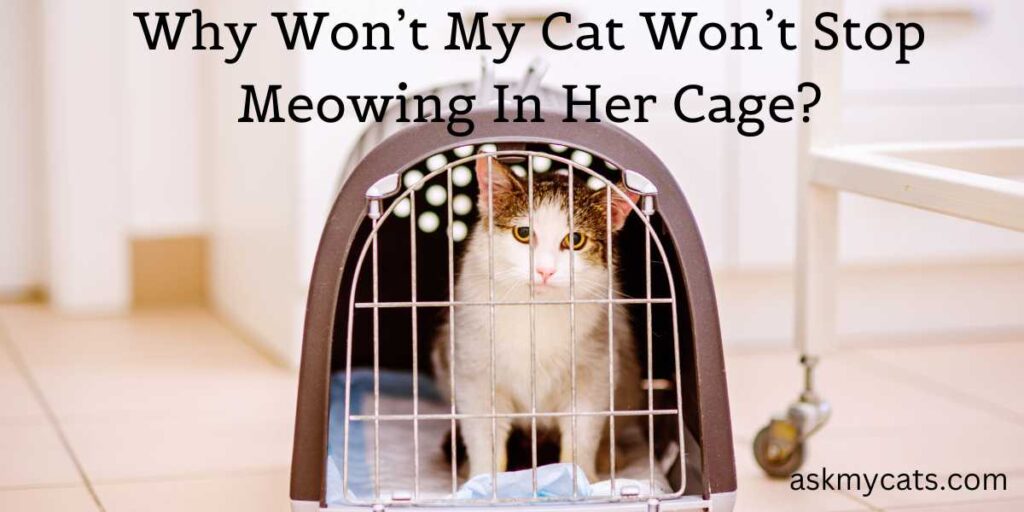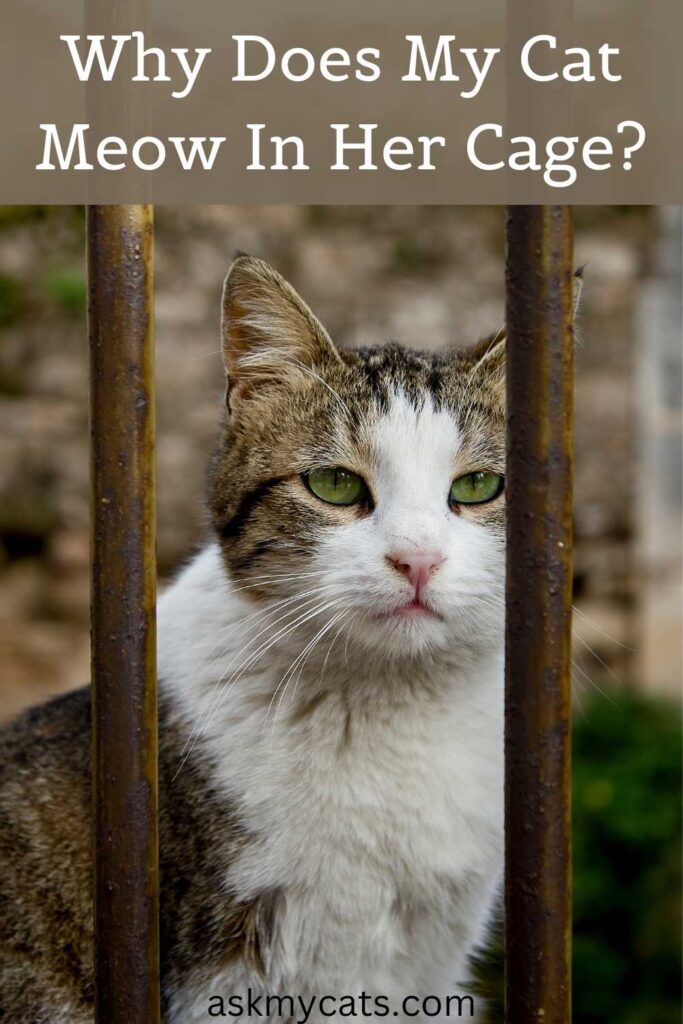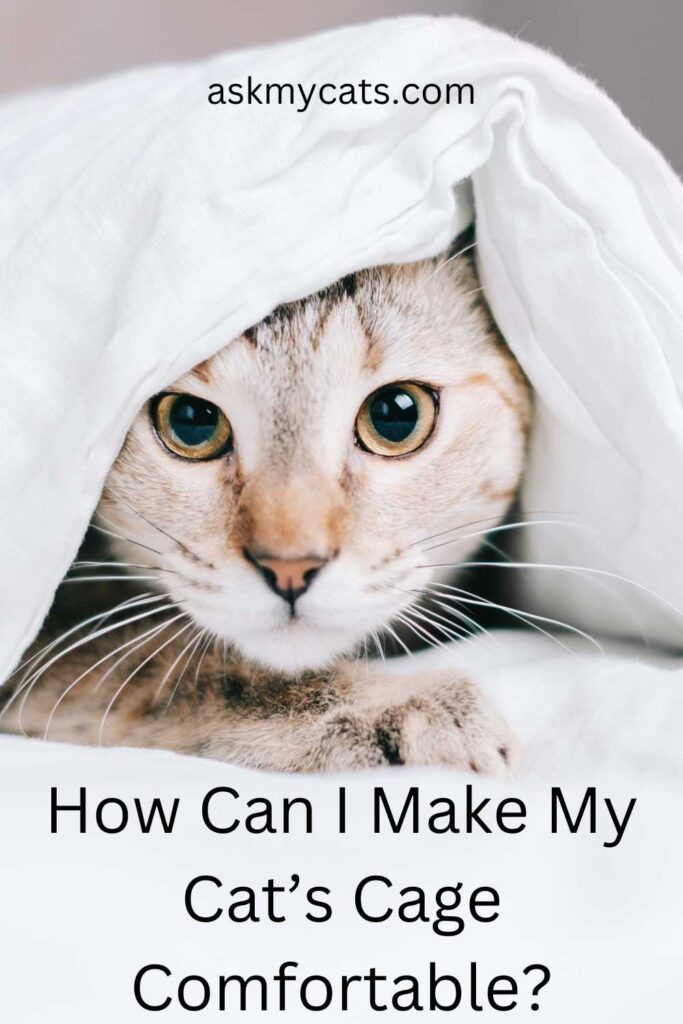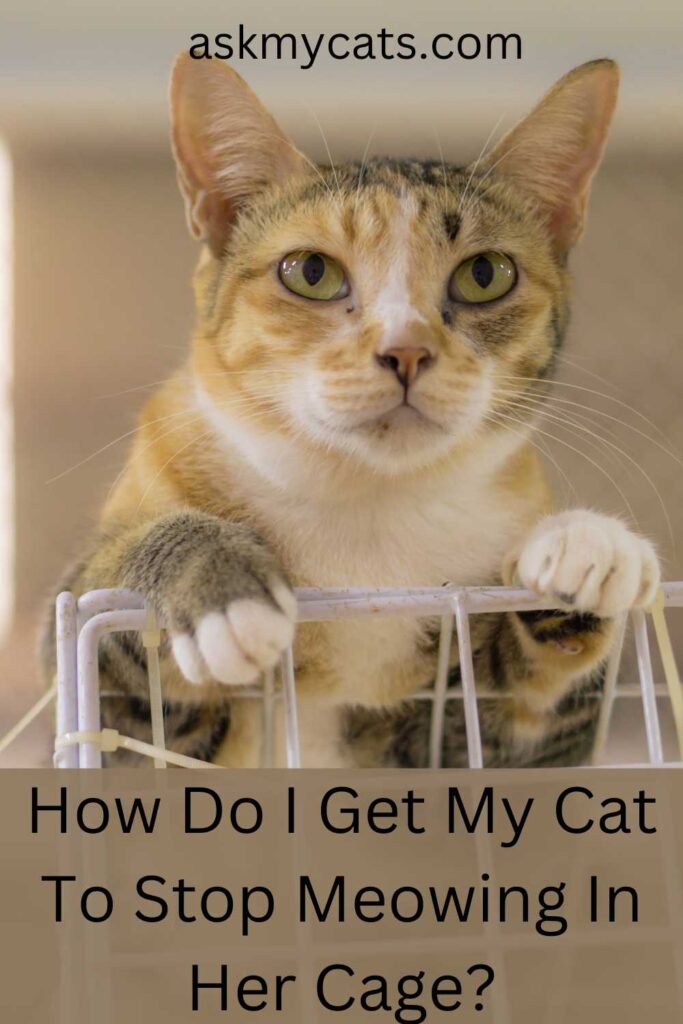It’s happened again.
Your kitten is meowing from her cage at an ungodly hour of the night, forcing you to stumble away from the inviting warmth of your bed and stagger next to the cage where she is crying her lungs out.
You ruefully wonder to yourself how many more sleepless nights are there in store for you. You think out loud “ What’s so awful about this cage that makes my kitten wail like a banshee?”
To answer your question, cats are independent animals, they prefer open space and unrestricted movement. Therefore, being cooped up inside a tiny cage is probably their definition of hell.
In this article, we will delve deeper into why your cat won’t stop meowing from her cage and how you can make the cage a more comfortable space for her.


Give Your Cat the Perfect Day
Get the Free Ebook!
Why Does My Cat Meow In Her Cage?
There are multiple reasons why your cat could be meowing in her cage.
However, the most obvious one is that your kitten simply isn’t comfortable with being put in a cage. Cats trace back their lineage to wild hunters and so their behavior patterns also reflect a predilection for freedom and autonomy.
This inclination is unlike those of dogs. Dogs live in dens and so they are much more comfortable with being kept in a cage as compared to kittens.

Let us also explore some other reasons why your kitten might be meowing:
1. Anxiety:
As already mentioned above, kittens don’t like being trapped in cages as it can be an extremely traumatic experience for them and might trigger anxiety.
Excessive vocalization is one of the primary symptoms of anxiety in cats. It’s pivotal that you seek immediate treatment if your cat has anxiety.
2. Attention:
Even though cats are seen as traditionally independent creatures, they still crave family interactions.
If you’re not giving your kitten the time of the day, then she will likely meow to grab your attention and affection.
3. Boredom:
Cages don’t provide much room for entertainment or stimulation so, in all probability, your kitten will be very lonely and bored being cooped up inside the cage.
4. Health Concern:
If your kitten is meowing incessantly, then this can also be a reflection of a health concern or ailment.
“Cats who become hyperthyroid meow a lot, particularly overnight. Hyperthyroidism is a disease most commonly seen in cats over 8 years old.”
Dr. Liz Bales, Catvocate
5. Hunger
Starvation or hunger could also be a reason behind your kitten’s meows.
Must Read: Why Won’t My Cat Shut Up?
How Can I Make My Cat’s Cage Comfortable?
From the get-go, cages don’t particularly seem like the perfect resting place. However, at times, one is compelled to put their kittens in cages for medical or other concerns.

Fortunately, there is a lot you can do to try and make your kitten’s cage a warm and snuggly cocoon for her.
1. Make It Cosy:
Cats spend most of the day napping so make the cage a sleep-conducive space: spread soft blankets and fuzzy towels at the bottom of the crate. You can also roll a hot water bottle under the covers for extra warmth.
2. Make It Spacious:
Even though kittens are tiny creatures, don’t let their size fool you, they still require ample amount of space to be appropriately comfortable.
Ensure that your kitten’s cage isn’t too small and has enough space for a food/water bowl, a litter box, and some toys.
3. Make It Fun:
It is important for a kitten’s health to be mentally and physically stimulated. Ensure that you keep plenty of toys and cat puzzles inside your kitten’s cage to keep her entertained and engaged.
Must Read: Can I Keep My Cat In A Cage Overnight?
How Do I Get My Cat To Stop Meowing In Her Cage?
To stop your kitten from meowing, you must also accurately pinpoint the reason behind her doing so. Once you have done that, you can start employing methods to curtail her meows.

A hungry cat will continue meowing even after being fed. Try to wait until your kitten quietens before feeding her any food.
Some cats meow at night to burn off the excess energy stored during the day. You can remedy this by wearing out your kitten before bed by playing with her or feeding her food just before bedtime. Eating makes cats sleepy.
If you fear that your kitten is attempting to express any health concern, then have her checked with your vet before ruling out the probability of a medical concern.
Your kitten might be meowing because her litter box is too dirty. Thus, regularly check and clean up her litter box before nighttime.
Ensure that your kitten isn’t bored or lonely in her cage. Make sure that she has ample toys and other stimulating activities to keep her entertained.
Before putting your kitten in her cage, let her grow accustomed to it. Familiarize her with the surrounding by keeping her inside the cage for short periods of time and later on, after she adjusts to it, you can leave her there for longer periods.
Spend time with your kitten when she is out of the cage as this allows her to feel your affection and know that she is cared for. This will make the prospect of a cage considerably less lonely and scary for your kitten.
Also, check out confining a cat to a room at night
Frequently Asked Questions
Can I lock my kitten in a cage?
No, you shouldn’t lock your kitten in a cage unless it’s due to an emergency or a medical requirement. Sometimes, cat owners lock their kittens for short periods of time to assist them in the healing period after surgery. Generally, a healthy, well-behaved kitten shouldn’t be locked or confined in a cage.
How long can a kitten be kept alone?
A healthy, adult cat can be left alone for about 24 hours, provided that she has her necessities like food, water, and a litter box within access. Kittens who are 5-6 months old can only be left alone for short durations of time like 4-6 hours.
Final Words
A cage isn’t a natural environment for cats; thus, they can take time to adjust to it. If you think that your kitten isn’t comfortable with being inside a cage and meows continuously to express her dissent, you can try various methods to make the cage less daunting and more inviting for her.
If she still doesn’t adapt to it, then perhaps, you can think of other alternatives to cages that would be more suitable to your kitten’s needs.
Interesting Read: Is It Cruel To Keep Cat Out Of Bedroom?
